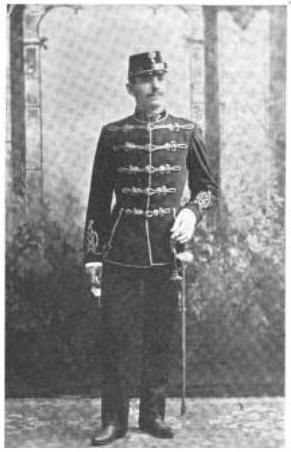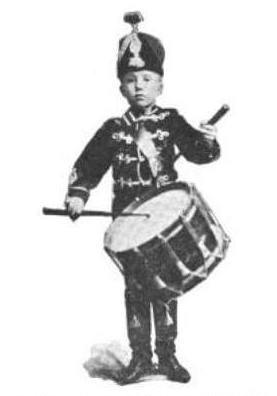|
The Musical Youngsters From Hungary Discovered in a Unique Abode Over the Orpheum
You'd scarce expect one of their age, much less forty of them, to appear upon the public stage—
In a great room over the Orpheum, that is a combination reception room, dining room, school boudoir, and conservatory of art, with a tiny attachment that is a vision of pots and pans and a smell of onions, and all home, sweet home—is where I found myself at six o' the clock, the other evening, when a vision of forty little musicians, done up in forty little nighties, and tucked up two in a bed in their twenty little beds, greeted me and I learned that they were resting their allotted hour before the evening performance. I use the word “resting" out of respect to Herr Schilzonyi, who is a nice man and appears to be going through life in a dress suit, and who told me that's what they were doing, though forty pairs of bright eyes gazed at me, and forty pairs of restless arms
and legs writhed and twisted and appeared to do anything but rest.
As I enter, the tiny genius nearest me, “clad in one simple clinging garment," innocent of bed clothes, but evidently forgetful of the fact, puts his hands modestly before his face, on my eyes en countering his—but I see that he peeks through his fingers!.
“Yes, yes,” says Herr Leader—who, since his two years travel in America recognizes and enunciates English as she is spoke, “they must be up at 7 in the morning and breakfast at 7:30. Then they have lessons—geography, arithmetic, spelling, and all that."
Just like the prosaic everyday boy who has not those marvelous bumps that mean music on his forehead, who doesn't know a scale in A minor from a foghorn, and who, if offered his choice between a silver cornet and a yellow dog, wouldn't take the yellow dog any way!
“Then there is the hour and a half of rehearsal, then luncheon”—which never has any Yankee doughnuts or apple pies in it, because the little Hungarians prefer their eternal porkelt, which is a combination of everything that tastes strong and smells loud, to our American sweetmeats, and the wisdom of whose preference is attested by their wholesome looking little faces and strong little bodies.
“The afternoon is the free time"—the time for the boys to take advantage of the nearest opportunity for boyish amusement—if in Boston in the winter, coasting; if at Harvard University, to play football; if at San Francisco, any time in a year, to shoot the chutes. Ah, shooting the chutes! “That was the best fun of all,” says a small musician, who doesn't happen to be in bed, as he is needed to help set the table, and who, being divested of musical instrument, his uniform, and all that makes him such an interesting little figure on the stage, is a mere “boy."
Just one inch on the tops of their dear little heads, and just one inch to the tail of their dear little coats, is all the change you perceive in the Knaben-Kapelle since they left Los Angeles two years ago. But their artistic and educational progress is quite another thing.
Ever since they left Los Angeles last, with their little tow heads, their big brass instruments looking several sizes too
|
large for them, and never a word of English to bless themselves with, but with the universal language of music stowed away in the heads which were such a little, little way from the ground, they have been touring the United States, improving amazingly by their constant practice together, picking up our language with characteristic boyish quickness. and incidentally playing their way into the hearts of everybody from California to Maine.

NICKLOS SCHILZONYI
DIRECTOR OF THE HUNGARIAN BOYS' BAND

MICHEL BRAUNN, THE TINY DRUMMER OF THE BOYS' BAND
And from Herr Schilzonyi I learn that it was all only a musical pilgrimage—a sojourn in a weary land—of which Boston was the artistic Mecca!
Ah, yes, Boston was the place for the Knaben Kapelle! She wined them and di—no, not that— probably concerted, and receptioned, and pink-teaed them nearly out of their small lives! At any rate, took time from picking bugs off herself to give them the welcome they so richly deserve.
And no little musician need become, in the Dickinsonian sense, a “a hinfant phenomenon" either, for whenever a boy outgrows the required number of inches, he can be whisked back to Hungary and another taken from the school at Billet, in Hungary, where they make the article!
~FANCHON
|